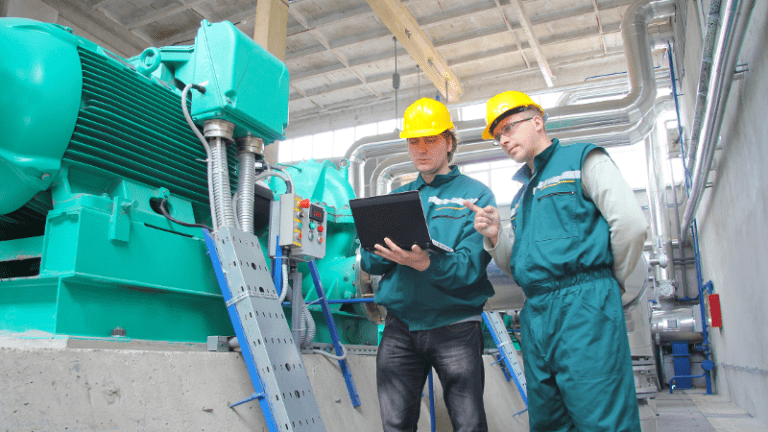Industrial chillers ensure efficient and safe operation in any environment that relies on heavy equipment with significant waste heat. Chillers cool pieces of equipment, process fluids, and ambient temperatures.
While an industrial chiller can improve performance in just about any relevant workplace, there are also situations where it is “mission critical.” When multiple pieces of equipment are in a closed environment, cooling and ventilation are essential.
When waste heat is allowed to gather with no effort to move or neutralize it, it can damage equipment and shorten its service life. Likewise, it can make the environment much more dangerous for personnel.
Following safety and PPE rules is no substitute for proactive management of waste heat. Since industrial chillers are highly efficient, they will help you reduce energy usage and other negative consequences of heat-intensive production processes. Metal plating, injection molding, server rooms and others benefit.
Which Compressors Are Used in Industrial Chillers?
Not all industrial chillers use compressors. Some operate on the principle of heat absorption. This uses heat exchangers to pull heat from the target process and redirect it so it will safely dissipate outside. Unfortunately, this can turn into an inefficient, error-prone process.
To maximize performance and control, vapor compression industrial chillers and others that work in tandem with a commercial compressor are your best bet. In a vapor compression chiller, refrigerant circulates through piping to pull heat away. Heated coolant is redirected to a refrigeration system.
Within the refrigeration system, the coolant is actively chilled so it can be recirculated.
While chillers all use familiar HVAC principles for operation, an active industrial chiller with an industrial compressor is intended for heavy usage. Choosing the right commercial compressor starts with selecting the right compressor architecture, of which there are several.
Centrifugal Compressors in Industrial Chillers
As the name suggests, centrifugal compressors use centrifugal force to compress refrigerant vapor. They are designed to manage projects with large cooling loads, such as a manufacturing floor where multiple heat-intensive processes take place. They are among the largest compressors available.
Centrifugal compressors are used in hospitals, universities, navy ships, and in other environments where the equipment or materials to be cooled are considered mission-critical. While 99.99% uptime is the goal for all compressors, centrifugal compressors are a premium choice for maximum reliability.
Screw Compressors in Industrial Chillers
Screw compressors are available in a variety of sizes and form factors. They were initially designed to address use cases in which reciprocating compressors were not optimal, but both are still in use today.
In screw compressors, closely mated rotors facilitate compression without coming in direct contact. As a result, they suffer minimal vibration and friction, greatly reducing noise output. They can be positioned in areas where other compressors might be disruptive.
In terms of sheer output, centrifugal compressors are required for the most intensive applications. That said, screw compressors are reliable, easy to service, and more compact than a comparable centrifugal compressor. They are ideal for medium-load environments.
The Role of the Compressor in Industrial Chillers
In active chiller systems, a compressor performs the mechanical work necessary to move the coolant and make it available to other components. The cooling cycle depends on the compressor. While the compressor can work harder to make up for inefficiencies elsewhere, the reverse is not an option.
Compressor problems will bring down an industrial chiller, and the compressor will need to be repaired or replaced before returning to service. Generally speaking, industrial compressors are highly reliable and can be counted on for 8-10 years of service, but this depends on maintenance and the surrounding environment.
It’s crucial to be especially attentive to industrial compressors that support industrial chillers. If the operating environment strays out of the unit’s temperature tolerances, the compressor can still fail. Likewise, if there are other risk factors, like indoor industrial pollution.
Use Remanufactured Industrial Compressors for Industrial Chillers
Once your chiller is operational, it’s vital to ensure you replace the compressor only with the same make and model. Likewise, you should use replacement parts from a source you can count on for commitment to quality. A compressor remanufacturing company can help.
Remanufactured commercial compressors undergo a complete process to clean, repair or replace various parts and testing before the sale. Any compromised components are replaced. The remanufactured unit is tested before being trucked or shipped to your workplace.
This ensures access to the exact compressor you need, faster and at a lower price. Plus, you’ll have the opportunity to get expert advice on optimizing and maintaining your industrial chiller from a team that understands the demands you place on them.
Industrial chillers represent a more intensive cooling application than the average commercial HVAC or refrigeration system. With that in mind, don’t compromise on quality. The right decisions on commercial compressors now will pay off for years to come.












